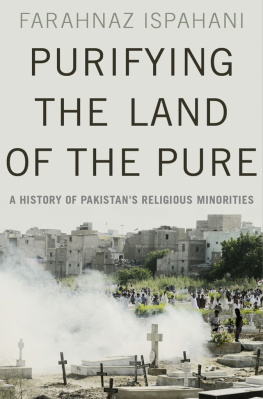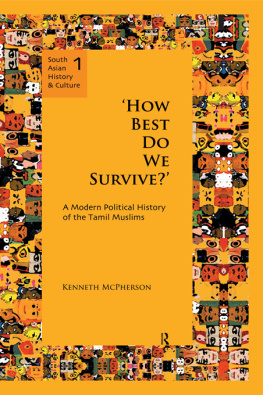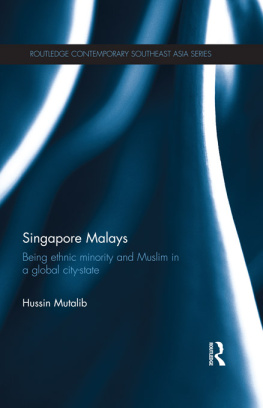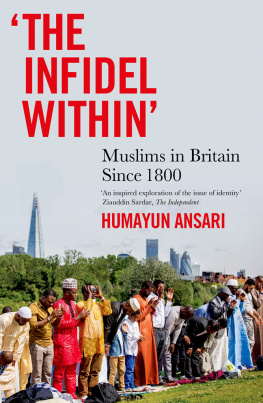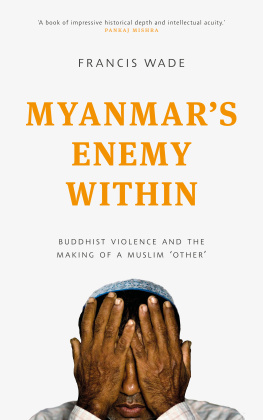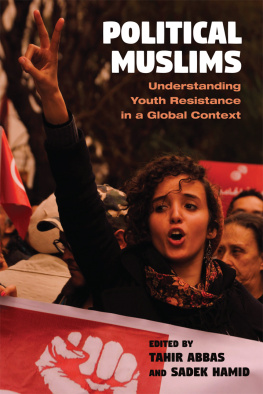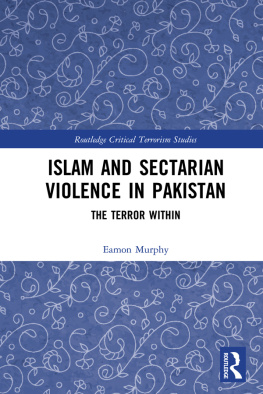PURIFYING THE LAND OF THE PURE


Oxford University Press is a department of the University of Oxford. It furthers the Universitys objective of excellence in research, scholarship, and education by publishing worldwide. Oxford is a registered trade mark of Oxford University Press in the UK and certain other countries.
Published in the United States of America by Oxford University Press
198 Madison Avenue, New York, NY 10016, United States of America.
Oxford University Press 2017
All rights reserved. No part of this publication may be reproduced, stored in a retrieval system, or transmitted, in any form or by any means, without the prior permission in writing of Oxford University Press, or as expressly permitted by law, by license, or under terms agreed with the appropriate reproduction rights organization. Inquiries concerning reproduction outside the scope of the above should be sent to the Rights Department, Oxford University Press, at the address above.
You must not circulate this work in any other form and you must impose this same condition on any acquirer.
Library of Congress Cataloging-in-Publication Data
Names: Ispahani, Farahnaz, author.
Title: Purifying the land of the pure : a history of Pakistans religious minorities / Farahnaz Ispahani.
Description: New York, NY : Oxford University Press, 2017.
Identifiers: LCCN 2016030376| ISBN 9780190621650 (hardcover : alk. paper) | ISBN 9780190621674 (epub)
Subjects: LCSH: Religious minoritiesPakistan. | PakistanPolitics and government19711988. | PakistanPolitics and government1988
Classification: LCC BL2035.5.R45 I87 2017 | DDC 305.6095491dc23 LC record available at https://lccn.loc.gov/2016030376
CONTENTS

A Jamaat-ul-Ahrar spokesperson, Ehsanullah Ehsan, announced that his Islamist militant group had targeted Christians as a message to Prime Minister Nawaz Sharif that they had entered Lahorethe prime ministers hometown. The terrorists wanted the government to halt military operations against their safe havens in Pakistans remote tribal areas bordering Afghanistan.
The Easter Sunday attack had been preceded a year earlier by twin suicide bombings at churches in Lahores Youhanabad area, which killed at least fifteen people and sparked violent protests across the city by the Christian minority. That terrorists chose to target religious minorities, including their children, to caution the government reflected the vulnerability of Pakistans already embattled religious minorities.
Pakistan, a country created in the name of Islam, has witnessed some of the worst persecution and discrimination of religious minorities in a world that is increasingly becoming unsafe for minorities. The Human Rights Watch World Report 2016 cited examples of religion-based violations of human rights from several countries, including those in
Religious freedom, and the right of religious minorities to live in peace, is being threatened by communal majoritarianism, which has been at the heart of Pakistans policies over the years. This trend reflects the majoritys insistence that the religious minorities practice their faith and culture within limits prescribed by the majority. It contravenes the United Nations Universal Declaration of Human Rights, which proclaimed in 1948 that everyone has the right to freedom of thought, conscience and religion; this right includes freedom to change his religion or belief, and freedom, either alone or in community with others and in public or private, to manifest his religion or belief in teaching, practice, worship and observance. That declaration represented the aspirations of a world that had just gone through the horrors of World War II and did not want further conflict on religious and ideological grounds.
Now, however, terrorist organizations acting in the name of faith are destroying religious diversity in significant parts of the Middle East, Sub-Saharan Africa, and Asia. The atrocities perpetrated by the Islamic State in Iraq and Syria (ISIS) are widely known. These include mass executions and forced conversions alongside the kidnapping, enslavement, and rape of thousands of non-Muslim women and children.
A United Nations human rights report in March 2015 noted that ISIS had committed genocide, war crimes and crimes against humanity in its attacks against ethnic and religious groups in the country. Other factions involved in the Syrian civil war have fared no better. The regime of Bashar al-Assad is accused of targeting Sunni Muslims while Jabhat al-Nusra conducted targeted executions of religious leaders, including seven Druze clerics in Dara Province and a Jesuit priest in Homs.
Regimes, such as those in Saudi Arabia and Sudan, continue to inflict harsh punishments for apostasy and blasphemy. In Iran hundreds of Bahais, Christians, Sufi Muslims, Yarsanis, and Shia Muslims are in prison for professing a doctrine not approved of by the clerical regime. Religious conflict has often driven the politics of Lebanon whereas the Christian Copts in Egypt have come under attack by religious extremists.
Boko Haram has targeted non-Muslims in northern Nigeria, Cameroon, Chad, and Niger, forcibly kidnapping, converting, enslaving, and selling young women and girls. In one such incident on April 14, 2014, Boko Haram kidnapped more than two hundred mostly Christian girls from Chibok, Borno State, sold them into slavery, and forcibly converted them to their version of Islam, which many mainstream Muslims find offensive.
The lack of tolerance in parts of the Muslim world has been accompanied by a resurgence of hate groups in western countries. A rise in anti-Semitic attacks has been reported across Europe, especially France and Germany, resulting in assaults on institutions, as well as desecration of monuments and cemeteries. Although western nations have constitutional and legal mechanisms in place to restrain and even punish perpetrators of religiously motivated attacks, it is not always easy to shut down hate speech amidst controversies over freedom of expression.
India, the worlds largest democracy, also faces the dilemma of having a secular constitution but a religiously divided public. Sectarian and communal hysteria, aroused to secure votes for Hindu nationalist political groups, is proving difficult to contain after elections. Having taken pride in their countrys secular character for decades, Indians are now having to deal with incidents such as extremist Hindus attacking (and in some cases killing) Muslims and Christians over eating beef. Hindus deem the cow sacred but few believe its protection should involve violating the sanctity of human life.
Religious minorities in Russia and Central Asiaruled by ostensibly secular authoritarian regimesalso face threats. For example, in eastern Ukraine, Russian-backed separatists kidnapped, tortured, and threatened Protestants, Catholics, and Jews. Russias extremism law is open to abuse by allowing prosecution for inciting religious discord even in the absence of any threat or act of violence.a Russian prison. In the Central Asian republics, former communist apparatchiks continue to suppress all public manifestations of religion.

